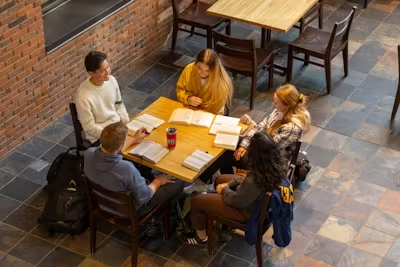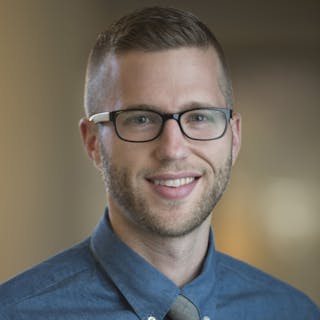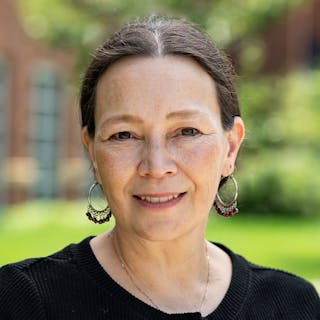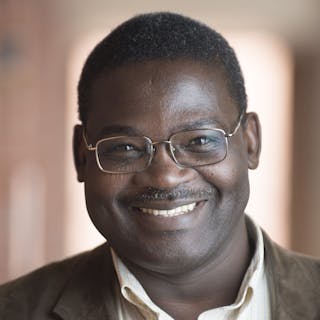


By adding a minor in digital humanities, you’ll fuse the traditional strengths of the humanities—the search for knowledge about human culture, and the cultivation of intellectual curiosity and empathy—with a greater understanding of digital-age skills. You'll learn collaboratively how to use digital technologies to ask and answer meaningful questions and to communicate persuasively. This minor pairs well with traditional humanities majors or degrees like English as you seek to blend what you’re learning with modern, technology-fueled mediums.
Contact us
Request info
Interested in learning more about Bethel's minor in digital humanities? Fill out this simple form and we'll send you more information soon.
Connect with a counselor
They’ll answer your questions, connect you with professors, and help you find the right time to visit campus. They’ll be there every step of the way to help make applying to Bethel as smooth as possible.
Courses and skills
What skills will I develop?
As a digital humanities student, you'll learn a range of skills, from technical abilities like coding, graphic design, and the ability to analyze “big data,” to traditional humanities skills like close reading, critical thinking, and persuasive communicating. Most importantly, you'll acquire a skillset tailored to your own projects—each student’s pathway is unique. And as you move into your career, these are skills that are beneficial in multiple professions.

Strong technical abilities
You’ll learn a range of skills, from technical abilities like coding, graphic design, and the ability to analyze “big data,” to traditional humanities skills like close reading, critical thinking, and persuasive communication.
Skills to match your goals
You can tailor the minor to your own projects and your unique education and career aspirations. And as you move into your career, these are skills that are beneficial in multiple professions.
Modern storytelling
Many courses allow you to explore subjects like journalism or storytelling using modern tools like documentary filmmaking, podcasting, blogging, and digital preservation.
Skills for any career
You’ll forge a strong base of skills in communication, teamwork, research, writing, and more to prepare you for your career and for graduate and professional schools.

Academic plans
Map out your time at Bethel—from day one to your diploma. Your course schedule is designed to help you grow, gain skills, and become who you’re meant to be.
Learning opportunities
What experiences will I have?
Hands-on learning is at the core of all Bethel majors and minors. You’ll find numerous opportunities to get involved, apply what you’ve learned, and gain experience—all in a community where you belong.

Collaborative learning
This interdisciplinary minor will give you opportunities to collaborate with peers and professors across the university as you apply lessons from digital humanities to other disciplines.

Research
You’ll have the chance to conduct research with professors through programs like Edgren Scholars and summer research projects.

Modern application
You’ll have the chance to learn relevant tech skills in areas like documentary filmmaking, podcasting, blogging, and digital preservation.
Real-world impact
How will this minor help my career goals?
A background in digital humanities will help you stand out in the job market as you show an ability to blend critical thinking, clear writing, and creative problem-solving skills with digital skills.
Stand out to employers
Increase your job prospects and earnings by gaining skills in IT networking and support, data analysis, social media, programming, marketing, and graphics.
Develop your storytelling skills
Put your skills to use by telling powerful using modern tools like documentary filmmaking, podcasting, blogging, and digital preservation.
Prepare to serve in industries and businesses
The digital humanities will help prepare you for a career at businesses and nonprofits in areas like marketing, technology, media, and more.
Gain tools to work in education
A growing number of education education roles require digital humanities credentials. It’s also useful for jobs in library and information science, and museum studies.
Apply your faith to your career
As you study from a Christian perspective, you’ll be well-equipped to glorify God wherever your career takes you.

Start your journey
Explore Bethel for yourself
Visiting campus is the best way to learn about Bethel and our majors. As you try out academic and campus life at Bethel, you can attend a class, chat with students, meet professors and coaches, tour campus, and get a taste of life in our program.
Faculty mentors
Meet your professors
You’ll learn alongside faculty who are distinguished scholars and faithful Christians. They’ll know you by name and invest in your success. Professors are accessible and usually have an open-door policy so you can stop by with questions, and you’ll often find students gathered in the “HiPPos Suite.”
Department of History, Philosophy, and Political Science
Location
Contact

A path with promise
Clear price. Clear outcomes.
Know what your education costs—and where it’s taking you. You’ll start with a clear price so you can focus on what truly matters: your education and your future. And you’ll graduate with confidence through the Bethel Career Commitment, which includes built-in career coaching and additional support for eligible graduates who still need help.
Find your fit
Explore related programs
This flexible minor will complement almost any major you choose. But here are a few examples:



Explore the full lists:
















